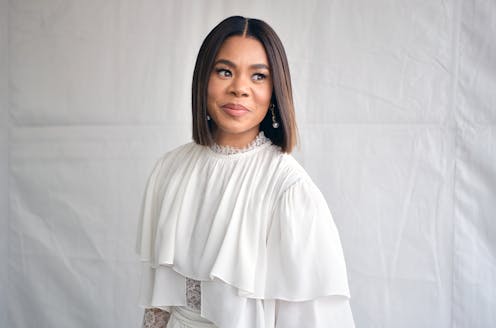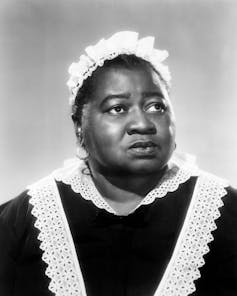
When the Academy of Motion Picture Arts and Sciences announced the nominees for its 95th Oscars and three of the most celebrated films of the season – “The Woman King,” “Till” and “Saint Omer” – received no nominations, a familiar refrain of frustration rang forth.
These films demonstrated typical dramatic and technical markers that tend to predict cinematic success – positive reviews, scripts inspired by true stories and adherence to dramatic formulas. So it was natural to wonder whether the fact that each featured a Black female director and Black female cast may have had something to do with the snubs.
Awards are certainly about more than pomp and circumstance. Gina Prince-Bythewood, who directed “The Woman King,” issued a heartfelt reflection on the significance of the Academy Awards for filmmakers from underrepresented groups.
They matter, Prince-Bythewood wrote, because directors can leverage those nominations and wins to make more films with larger budgets – the kinds of movies that only those with Oscars on their resumés will be in the running to direct.
As someone who studies, teaches and writes about Black popular culture, I understand how industry dynamics subject Black productions to greater scrutiny. Against this backdrop of skepticism, filmmakers have established a Black cinematic tradition that’s less anxious about capitulating to a system that has long marginalized Black stories.
So what other metrics, beyond recognition from the Academy, might be considered when gauging the state of Black cinema?
For me, two films from 2022 – “Master” and “Honk For Jesus. Save Your Soul.” – demonstrate just how far filmmakers have progressed in redefining Blackness on the silver screen. They dig deep into the interior lives of a spectrum of Black characters, showcasing the ways in which filmmakers are pushing back against mainstream representations of Black womanhood.
A history of exclusion and controversy
The academy’s troubled relationship with Black filmmakers is as old as the association itself. After the inaugural banquet was held in 1929, it took 11 years for the first African American, Hattie McDaniel, to go home with an Oscar.

She won for her portrayal as Mammy in “Gone With The Wind,” but her Black peers didn’t uniformly celebrate her historic win: Mammy was a one-dimensional caricature based on the premise of Black subservience, so some of them saw McDaniel as contributing to the denigration of Black people on screen.
Oscar controversy continued into the 21st century. While the 2002 Oscar wins of Halle Berry and Denzel Washington signaled an acknowledgment of Black artistry in film after decades of dismissals, some critics pointed out that they won for roles that reflected degrading stereotypes of Black people.
Given this history of exclusion and degradation, Black filmmakers and institutions have long forged separate infrastructures for producing, distributing and honoring Black cinematic art. I have written elsewhere about how storyteller-entrepreneurs such as Oscar Michaeux and Eloyce Gist established a filmmaking tradition that skirted the commercial – often racist – logic that can govern Hollywood decision making.
Their desire to tell stories in a way that resonated with Black audiences compelled them to avoid mainstream industry gatekeepers. In “Within Our Gates” (1920), for example, Micheaux directly challenges racist stereotypes advanced in the infamous “Birth of a Nation” (1915).
Gist, who collaborated with her husband James, made films featuring explicit spiritual themes, such as “Hellbound Train” (1930).
Both filmmakers envisioned an African American audience for their work and took the mission of racial uplift seriously.
Progress beyond Hollywood benchmarks
While contemporary scholarship celebrates their legacy, Hollywood never embraced filmmakers like Gist and Micheaux. The racial hierarchy that determined whose stories made it to the big screen in the 1920s has mostly persisted over the past century.
However, over the past 12 years, streaming and web-based platforms have allowed today’s Black filmmakers to write new kinds of characters into being – and have liberated them from both traditional gatekeepers and the pressure of appealing to the masses.
As I explain in my study on Black women’s representations in popular culture, a new generation of storytellers have benefited from the efforts of media companies to stand out by targeting typically underrepresented audiences.
These filmmakers have found homes for their films on streaming services such as Amazon Prime and Peacock. These platforms afford them the opportunity to reach smaller niches without large production and promotion budgets.
Redefining Blackness on screen
In addition to showcasing lesser-known talents, a number of independent Black films released over the last year have also expanded the types of stories that get told about Black life and the types of characters that Black actors get to play.
Two, in particular, stood out to me.
In “Master” and “Honk For Jesus. Save Your Soul.,” actress Regina Hall assumes roles that allow her to move beyond the archetypes that have defined her career.
In Mariama Diallo’s “Master,” Hall stars as Gail Bishop, a tenured professor who is the first Black “master,” or head of a residential college, at a prestigious university in the Northeast.
Audiences first encountered Hall in the 1999 film “The Best Man,” in which she plays a young woman paying her way through college as an exotic dancer.
In the years that followed, she starred in a number of Black romance films, a subgenre that surged in popularity in the late-20th and early-21st centuries. Many of these films reflected and reinforced an intraracial anxiety about declining marriage rates among African American women. The Black women characters that existed in these films, such as Hall’s starring role in “Think Like A Man” (2012), fetishized marriage: The characters tended to design their lives in pursuit of it.
However, in “Master,” Hall is catapulted away from the sunlight-filled spaces of romantic comedy and into the haunted corridors of a predominantly white university. Even Hall’s usually straight tresses have been exchanged for short, tightly coiled curls, reflecting an aesthetic common today among Black women professors.
Drawn from the Senegalese-American writer and director’s own experience of negotiating such an institution as a student, the film departs from the typical storytelling formula that suggests that Black people who get into college or are hired as faculty have “made it.” Instead, viewers gain access to the various terrors – often ignored by all except those subject to them – that lurk in every classroom, frat party and faculty meeting.
Hall’s Gail shatters the myth that those positioned higher on university organizational charts are better shielded from racial trauma than their students.
Showcasing Black women’s struggles
In “Honk For Jesus. Save Your Soul.,” the debut feature film for sisters Adamma and Adanne Ebo, Hall offers yet another stereotype-defying portrayal as Trinitie Childs, the wife and professional partner of a disgraced megachurch pastor. Having offered financial settlements in exchange for his accusers’ silence, the film chronicles Pastor Childs’ attempt to redeem himself from a sexual misconduct scandal that led most of his congregants to leave the church.
Like many “first ladies” – the term commonly used to describe the leadership role of pastors’ wives in Protestant denominations – Trinitie has invested years of her own administrative talents into a ministry tethered to her husband’s image. For this reason, she’s reluctant to relinquish their position – and the affluent lifestyle it affords them – even in light of her husband’s transgressions.
“Honk For Jesus” complicates the image of respectable Black Christian womanhood, not by releasing Childs from the shackles of this standard, but by revealing the elaborate ruminations and compromises required to maintain it.
Yet the film contains translatable truths about the psychic burden of adhering to any sort of ideal. You don’t have to be the wife of a pastor to see, in Trinitie’s plight, the burdens of being a “good wife” or a “respectable Black citizen.”
In Hall’s portrayal of Childs, I see a thread to her previous, marriage-obsessed characters. Becoming a wife may be the end of one obstacle course, but it’s the beginning of another.
These two films might not headline the awards season, but they nonetheless attest to how Black filmmakers are continuing to produce their stories even without traditional Hollywood backing.
Timeka N. Tounsel does not work for, consult, own shares in or receive funding from any company or organization that would benefit from this article, and has disclosed no relevant affiliations beyond their academic appointment.
This article was originally published on The Conversation. Read the original article.







